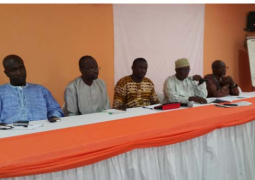The 'Take Our Daughters to Work Programme' can be interpreted as an initiative meant to turn stumbling blocks to stepping stones for girls in The Gambia. Under the programme, 25 girls in the
The rationale for this initiative is for the protégé to build her self-esteem, face the unknown future with greater confidence and then live a more purposeful life. For too long, women have been relegated to the background, treated as inferior beings whose only abode is the kitchen. For example, if a family is faced with a choice of educating a boy or a girl, it is the boy who is given the chance to go to school. In their press release, the organizers of the 'Take Our Daughters to Work' spell out the thinking behind this ridiculous practice. It reads: "Girls in The Gambia face the same obstacles that female students in all parts of the world encounter, such as low self-esteem, peer pressure not to excel, low teacher expectations, and few female role models. However, the Gambian female has an especially hard time finishing and excelling in school due to the added pressures of early marriage, teenage pregnancy and lack of encouragement and support from parents."
The barriers are real, but they can be surmounted through perseverance and conscious efforts such as this initiative. That is why all stakeholders should throw their weight behind the FAWEGAM in its determination to create opportunities for educational, social, and economic advancement for the girl child. As regards the issue of teenage pregnancy, we would like to suggest that no girl child should be stopped from continuing on with her education because of it.
Our second suggestion is that more time should be set aside for the mentoring process. Three days seem inadequate to make the desired impact. Preferably, it should be done during the summer holidays when the students will have enough time to understudy their mentors. It is possible that the organizers have limited themselves to a few days because of insufficient resources. This suggestion is nonetheless meant as food for thought for them.
We want to reiterate that the 'Take Our Daughters to Work Programme' is a great initiative that promises to transform the entire gender equation. With it, we are optimistic that our female students will no longer see themselves as toys subjected to the whims and caprices of the other sex. We wholeheartedly welcome it.
"One is not born a woman: one becomes a woman"
Simone de Beauvoir
Read Other Articles In Article (Archive)



